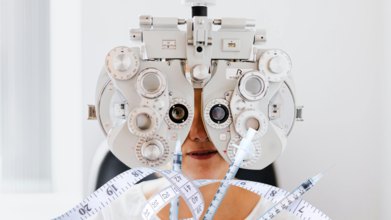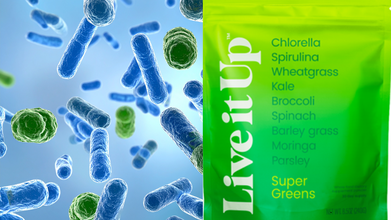- Health Conditions A-Z
- Health & Wellness
- Nutrition
- Fitness
- Health News
- Ayurveda
- Videos
- Medicine A-Z
- Parenting
Popular Weight Loss Drugs Could Be Linked To Vision Loss, Finds New Study

Credits: Canva
Ozempic Lawsuit: "This week's study doesn't suggest that GLP-1 cause your eyes to fall out exactly, but, as you will see in a second, it is not that far off," says Dr F Perry Wilson, MD, MSCE, physician, researcher, educator, and writer, at Yale School of Medicine, before he begins to explain what the new study suggests of the side effects.
Weight loss drugs have gained popularity up recently. The popularity is for all the right, and the wrong reasons too. While up recently, we have Wegovy being approved for treating MASH, we also have unheard side effects of the popular drug Ozempic, and not to mention, the cases of pancreatitis reported in the UK, and the ongoing lawsuit on Ozempic.
So, what does this new study add to all this?
Weight Loss Medication And Vision Loss
Two studies, published in JAMA, analyzed how semaglutide, an injection used to treat type 2 diabetes that helps control your blood sugar, and tirzepatide, an antidiabeteic medication, also used to treat type 2 diabetes and for weight loss, administering via injections, which include popular drugs like Ozempic, Wegovy, Mounjaro and Zepbound, impacted eye health in Americans with type 2 diabetes over a 2-year period.
What Did The Study Find?
One of the studies found a modest risk of developing a non-arteritis anterior ischaemic optic neuropathy (NAOIN), which is a rare eye condition that can lead to sudden vision loss due to lack of blood flow. This condition has close links with the consumption of semaglutide and tirzepatide.
Out of more than 159,000 participants with type 2 diabetes, 35 developed NAION, compared to 19 people in the comparison group. The Ohio-based researchers also noted an increased risk of developing "other optic nerve disorders" identified in 93 patients.
The second study found no statistically significant link between GLP-1 drug use and NAION, a rare eye condition, but reported a slight uptick in cases of diabetic retinopathy, a retinal disease that can cause vision loss.
The study observed that individuals with type 2 diabetes who were treated with GLP-1 drugs faced a modestly higher risk of developing diabetic retinopathy. However, researchers emphasized that fewer patients progressed to sight-threatening stages of the disease. They concluded that all patients with type 2 diabetes receiving GLP-1 therapies should undergo regular screening and monitoring for potential eye complications, regardless of whether they already have diabetic retinopathy.
"These findings suggest that all patients with type 2 diabetes treated with GLP-1 RAs, regardless of preexisting diabetic retinopathy, should be regularly screened and monitored for potential complications," the study authors concluded.
What Are The Experts Saying?
As questions continue to mount about the potential connection between GLP-1 weight-loss drugs and vision problems, experts stress that more research is needed before drawing firm conclusions.
Sue Decotiis, M.D., a medical weight-loss doctor in New York City, said she believes additional studies are required to confirm whether the drugs increase the risk of vision loss, pointing to conflicting findings so far.
"NAION is a rare condition of the optic nerve that, although serious, has not really been shown to be increased by these studies," Decotiis, who was not involved in the research, told Fox News Digital. "We need more studies for certain."
She noted that diabetic patients already face a heightened risk of eye disease due to blood flow and nerve damage. "Eye complications are often directly related to the degree or lack thereof of diabetes control," she explained.
According to Decotiis, GLP-1 drugs often help reduce the severity of type 2 diabetes, which can in turn lower the risk of eye disease. These medications have also been shown to reduce cardiovascular risks, such as hypertension, and improve circulation, both of which may benefit eye health.
For patients beginning GLP-1 treatment, she advised proactive monitoring. "We should take precaution with methodical ophthalmic care for diabetics on these drugs," she said. "However, let’s not throw the baby out with the bath water."
Ashley Brissette, M.D., an ophthalmologist in New York City, echoed that perspective, calling NAION an "extremely rare" but serious medical condition. She emphasized that the risk associated with GLP-1 drugs is also “extremely rare, at a risk of about one in 10,000, according to other studies.”
"I think caution with anything is warranted," Brissette told Fox News Digital. "And remember these are associations, not causations, so it's not to say that GLP-1 use causes NAION or worsening retinopathy, but their use is associated with these conditions."
She underscored the importance of thorough eye care: "From an ophthalmologic standpoint, these findings underscore the importance of baseline and follow-up eye examinations for patients starting GLP-1 therapy, especially those with pre-existing retinal or optic nerve risk factors."
Brissette added that while the benefits of GLP-1 drugs in reducing cardiovascular and metabolic risks are “substantial,” patients should be counseled on potential vision-related side effects, and “any sudden visual symptoms should prompt immediate ophthalmic referral.”
When contacted by Fox News Digital, Novo Nordisk, the maker of Ozempic and Wegovy, said it stands by the safety of its medications.
"Patient safety is a top priority for Novo Nordisk, and we take all reports about adverse events from the use of our medicines very seriously. NAION is a very rare eye disease, and it is not an adverse drug reaction for the marketed formulations of semaglutide (Ozempic, Rybelsus and Wegovy) as per the approved labels in the U.S."
The company added: "Novo Nordisk, on its part, has conducted an analysis across randomized controlled clinical trials with GLP-1 receptor agonists, including a blinded ophthalmologist evaluation to confirm NAION diagnoses. Our current assessment is that these data do not suggest a causal relationship between GLP-1 RA use and NAION events."
AIIMS Doctor Issues Warning After Patient Follows ChatGPT Advice, Suffers Internal Bleeding

Credits: AI GENERATED
In a serious caution to the public, Dr Uma Kumar, Head of Rheumatology at AIIMS New Delhi, has warned against using AI chatbots such as ChatGPT for medical self-diagnosis. As reported by Hindustan Times, she issued the warning while speaking to the media after a recent case at the institute exposed the risks of acting on automated health advice.
The concern followed an incident in which a patient developed severe internal bleeding after treating back pain based on suggestions generated by an AI chatbot. The patient consumed non-steroidal anti-inflammatory drugs without consulting a doctor or undergoing basic medical tests.
When AI Advice Turns Dangerous
According to doctors at AIIMS, the patient relied on an AI tool to manage persistent back pain instead of seeking clinical care. The chatbot recommended commonly used painkillers, which the patient purchased and took independently.
As Hindustan Times noted, the AI system had no access to the patient’s medical history or their risk of stomach and intestinal complications. What appeared to be a routine solution resulted in a life-threatening episode of internal bleeding.
Doctors say this reflects a growing pattern, where quick online answers are replacing medical evaluation, even for drugs that are widely available over the counter.
Why Medical Diagnosis Is Not Data Matching
Dr Kumar explained that medical diagnosis follows a structured process known as diagnosis by exclusion. Doctors rule out possible causes through examinations, laboratory tests, imaging, and patient history before deciding on treatment.
An AI model, however, works by identifying patterns in data. It cannot examine a patient, detect physical warning signs, or judge whether a symptom points to a deeper problem. In this case, proper investigations would likely have revealed a high risk of bleeding, a step that was entirely bypassed.
The Risk of Confident but Incorrect Guidance
Medical experts are increasingly concerned about what are often called AI hallucinations, where chatbots present information with confidence despite gaps or inaccuracies.
While platforms such as ChatGPT include disclaimers, their tone can appear authoritative, particularly to someone in pain. As highlighted by Hindustan Times, the recommendation to use NSAIDs was not unusual in general practice, but for this patient, it proved dangerous.
Without a doctor to check for contraindications or underlying conditions, even a common suggestion can lead to serious harm.
Doctors Call for Caution and Clearer Oversight
The incident has renewed debate over how AI platforms should handle health-related queries. AIIMS doctors are urging the public to treat online tools as sources of general information rather than personal treatment guides.
Experts believe AI can assist healthcare in limited roles, such as research support or administrative tasks, but should never replace professional diagnosis or supervision.
There are also calls for stronger public awareness and clearer regulation to prevent similar incidents. Doctors continue to stress that medical judgment, built on examination and evidence, cannot be replaced by algorithms.
What Is the Nematode-Based Cancer Detection Method? Delhi HC Upholds Patent Rejection

Credits: AI GENERATED
The Delhi High Court has turned down a Japanese company’s attempt to secure a patent for a cancer detection technique that relies on nematodes, or roundworms, ruling that it falls under diagnostic processes that cannot be patented under Indian law, regardless of how novel or non-invasive it may be.
Hirotsu Bio Science approached the High Court after India’s Controller of Designs and Patents rejected its patent application in August 2023, stating that the invention did not meet the criteria laid out in the Patents Act, 1970. In a detailed 25-page judgment delivered on Saturday, Justice Tejas Karia reaffirmed Section 3(i) of the Act, which clearly bars the patenting of diagnostic methods.
What Is the Nematode-Based Cancer Detection Method?
The nematode-based cancer detection method is a research-stage technique that uses microscopic roundworms, known as nematodes, to detect the presence of cancer. These organisms possess a highly developed sense of smell, allowing them to pick up on specific chemical cues released by cancer cells in bodily samples such as urine, breath, or tissue, as per Science Direct.
Laboratory experiments have shown that certain nematodes tend to move towards samples taken from individuals with cancer while avoiding those from healthy people. The underlying idea is that cancer changes the body’s chemical profile, creating odour patterns that these worms can detect, sometimes even at an early stage.
Scientists have looked at this approach as a potentially affordable and non-invasive screening option. However, it remains a concept under study and has not yet been accepted as a reliable medical test or used in routine clinical care.
Delhi HC Upholds Patent Rejection of Nematode-Based Cancer Detection Method
At the centre of the case was a patent application titled “Cancer detection method using the sense of smell of nematode.” Nematodes, often referred to as roundworms, are among the most widespread life forms on the planet and can be found in environments ranging from soil to living organisms.
The Japanese company aimed to patent a technology based on the biological response of Caenorhabditis elegans, a species of nematode recognised for its advanced olfactory abilities.
The firm explained that its invention relies on the chemotaxis of these worms, meaning their tendency to move towards or away from certain scents, which would serve as a biological signal for the presence of cancer.
According to the company, the nematodes showed avoidance behaviour when exposed to urine from healthy individuals, while being drawn towards urine samples from cancer patients. It claimed the method demonstrated complete accuracy during testing and could detect several cancers, including gastric, colorectal, and pancreatic cancers, even at very early stages.
Is This Process Patentable in India?
The main legal question was whether the method qualified as a non-patentable “diagnostic process” under Section 3(i) of the Patents Act, 1970. This provision excludes from patent protection any process related to medicinal, surgical, curative, preventive, diagnostic, or therapeutic treatment of humans.
Hirotsu Bio Science Inc challenged the rejection by the Controller of Designs and Patents in the High Court, arguing that their invention should be seen as a “detection” method rather than a “diagnostic” one. The company maintained that the process was carried out entirely in a laboratory setting, using samples such as urine or tissue, and did not involve any direct medical procedure or clinical decision-making on the human body.
FDA Issues Live It Up Super Greens Supplement Powder Recall Over Salmonella Outbreak

Credit: Canva
Health officials have issued a recall for the Live It Up Super Greens supplement powder after 45 people across 21 states were found suffering from salmonella across the US.
The Food and Drug Administration and Centers for Disease Control and Prevention issued an official recall on January 14 for the Live it Up Original and Wild Berry Super Greens dietary supplement powder flavors.
The affected products with expiration dates from August 2026 and January 2028 have been affected by this recall and include:
- Live it Up Super Greens, NET WT 8.5 oz (240g) with UPC 860013190804.
- Live it Up Super Greens, 30 – 0.28oz (8g) sticks, NET WT. 8.47 oz (240g) with UPC 850077468063
- Live it Up Super Greens, Wild Berry, NET WT 8.5OZ (240g), with UPC 860013190811
- Live it Up Super Greens, Wild Berry, 30 – 0.32oz (9g) Sticks, NET WT. 9.52oz (270g), with UPC 850077468070
Authorities has advised consumers to not eat, sell or serve the affected Live it Up-brand products and to contact the company for returns.
Additionally, officials are asking people to wash items and surfaces that may have touched the recalled super greens supplement powders using hot soapy water or a dishwasher.
Of the 45 illnesses, 12 resulted in hospitalizations, according to the FDA. No deaths linked to the recall have been reported.
What Is Salmonella?
Salmonella, or salmonellosis, is an infection caused by the Salmonella bacteria which can invade and destroy the cells that line the intestines, resulting in low water absorption. This makes it hard for the body to absorb water, which can give you stomach pains, diarrhea and fever.Apart from this, other symptoms include:
- Fever
- Nausea
- Vomiting
- Chills
- Headache
- Blood in the stool
Most people develop symptoms within 8 to 72 hours after exposure while most healthy people recover within a few days to a week without specific treatment. However, in some cases, diarrhea can cause severe dehydration and requires prompt medical attention.
While anyone can contract salmonella, children younger than five, elderly and people with weakened immune systems are more likely to develop severe infections.
Is Salmonella Life-Threatening?
Life-threatening complications may develop if the infection spreads beyond the intestines to other organs. The risk of getting salmonella infection is higher with travel to countries without clean drinking water and proper sewage disposal.
While most people do not require medical attention for salmonella infection, those at high risk may need a health care provider if the infection lasts more than a few days, is associated with high fever or bloody stools and appears to be causing dehydration, with signs such as such as urinating less than usual, dark-colored urine as well as having a dry mouth and tongue.
© 2024 Bennett, Coleman & Company Limited

